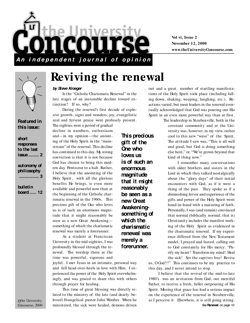Broadening the Distributism Discussion
by Philip Harold
Thomas Stork’s excellent article will hopefully provoke more discussion on a crucial issue for Catholic social philosophy. However I think a new direction is called for. It is important to engage the issue of a humane economic order on a level higher than that of dealing with the distribution of property. The problem with liberal economists is not that they are wrong. If fact, they have real truths to communicate which are important in the age in which we live, truths that must be utilized in our theoretical quest. The problem is that these truths are within a certain sphere of inquiry, and must be placed in the totality of personal existence. Economists do not often like to do this, because it diminishes the importance of what they have to offer. But any thinking on a personalist economy must start from the willingness to go beyond economics.
We must start from this openness because any study of human persons involves the value-complexes towards which they are related. Economics itself supposes a certain set of values which center around the problems of property and its distribution. That is, the more property, the better. This involves its own set of value distinctions, e.g. efficiency is good because it allows more total goods to be produced, certain uses of property are bad because they hinder the maximum production of goods.
Of course human persons are more than possessors of goods, and the value-complexes to which they are related is not confined to the sphere of ownership and production. Yet our social ethos, that is the prevailing value-complexes which exert psychic pressure to conform with them, renders different values more difficult to find. Other values are not on the surface of our lives, so to speak. An illustration of this might be seen in the production of pens. Currently pens are so cheap as to be practically community property: “Need a pen? Here take mine.” Our immediate thought is that this is terrific; we would not want it any other way. However I suggest this is because we do not immediately sense certain values which might have dropped out of the equation.
Consider for a moment this thought experiment: imagine an earlier society where pens and paper were scarce. Also imagine that these pens were predominately made of gold or silver, and were practically works of art. I submit that the handwriting of those lucky few to use these writing implements would probably not be sloppy, but beautiful. The words written would be carefully deliberated upon, and would be eloquent most of the time. The subject matter written on would usually be important or serious. There would be a greater respect for the written word.
As this imaginary case illustrates, there would be a different complex of values at work in the ethos of this society. It is not due wholly to the real factors of the scarcity of goods: if we suddenly made drastic changes in the writing supply industry in the United States these changes would not follow. The point however is to try to discern the true nature of liberal economic theory. Does it concern only the production and possession of property, well-integrated into the life of human persons, or does it rather affirm its own set of values, its own ethos which it seeks to inculcate in society, perhaps at the expense of the perception of finer values?
I believe this line of thought deserves reflection and discussion as the search for the best economic order goes on in the pages of the Concourse. If we stay on the level of the distribution of property, the only solution for the problems of capitalism will be statism. Or at least it will be perceived this way by liberal economists. Yet we want to agree with these same economists that statism is not the answer. A better approach, perhaps, is first of all to discover the true nature, the assumptions and value-complexes, of capitalism and liberal economic theory.
Philip Harold, FUS Class of ‘00
Philip Harold married Rachel Durbin (also class of ‘00) in June. The couple are living in Washington, DC, where he is pursuing a PhD in Political Science at Catholic University and she teaches junior high history.


